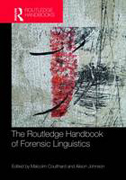
The Routledge Handbook of Forensic Linguistics" provides a unique work of reference to the leading ideas, debates, topics, approaches and methodologies in Forensic Linguistics. Forensic Linguistics is the study of language and the law, covering topics from legal language and courtroom discourse to plagiarism. It also concerns the applied (forensic) linguist who is involved in providing evidence, as an expert, for the defence and prosecution, in areas as diverse as blackmail, trademarks and warning labels. "The Routledge Handbook of Forensic Linguistics" includes a comprehensive introduction to the field written by the editors and a collection of thirty-seven original chapters written by the world's leading academics and professionals, both established and up-and-coming, designed to equip a new generation of students and researchers to carry out forensic linguistic research and analysis. "The Routledge Handbook of ForensicLinguistics" is the ideal resource for undergraduates or postgraduates new tothe area. Malcolm Coulthard is Professor of Forensic Linguistics at Aston University, UK. He is author of numerous publications, the most recent being "An Introduction to Forensic Linguistics" (co-authored with Alison Johnson, Routledge, 2007). Alison Johnson is Lecturer in Modern English Language at the University of Leeds, UK. Previous publications include "An Introduction to ForensicLinguistics" (co-authored with Malcolm Coulthard, Routledge, 2007). Contributors includes: Janet Ainsworth, Michelle Aldridge, Dawn Archer, Kelly Benneworth, Vijay K. Bhatia, Ronald R. Butters, Deborah Cao, Malcolm Coulthard, Paul Drew and Traci Walker, Bethany K. Dumas, Diana Eades, Susan Ehrlich, Fiona English, Edward Finegan, Tim Grant, Peter R.A. Gray, Gillian Grebler, Mel Greenlee,Sandra Hale, Chris Hei-er, Elizabeth Holt and Alison Johnson, Kate Haworth, Michael Jessen, Krzysztof Kredens and Ruth Morris, Greg M. Matoesian, Gerald R.McMenamin, Frances Rock, Laura Felton Rosulek, Nancy Schweda Nicholson, RogerW. Shuy, Lawrence M. Solan, Elizabeth Stokoe and Derek Edwards, Gail Stygall,Peter Tiersma, Tatiana TkacEaukova, and David Woolls. INDICE: Johnson & Coulthard 1. Introduction Current Debates in Forensic Linguistics SECTION I -- THE LANGUAGE OF THE LAW AND THE LEGAL PROCESS 1.1 LegalLanguageHolt and Johnson 2. Legal Talk. Sociopragmatic aspects of legal talk:police interviews and trial discourse. Bhatia 3. Legal Writing: Specificity Specification in legislative writing: issues of accessibility, transparency, power and control. Stygall 4. Legal Writing:Complexity Complex documents; average and not-so-average readers. Finegan 5. Legal Writing: Attitude and Emphasis Corpus linguistic approaches to 'legal language': adverbial expression of attitude and emphasis in supreme court opinions.Cao 6. Legal Translation Translating legal language 1.2 Participants in Police Investigations, Interviewing and Interrogation Drew and Walker 7. Citizens' Emergency Calls Requesting assistance in calls to the police. Ainsworth 8. Miranda Rights Curtailing coercion in police interrogation: the failed promise of Miranda v. Arizona. Rock 9. Witnesses and Suspects in Interviews Collecting oral evidence: police, the public and the written word. Benneworth 10. Sexual Offences Negotiating paedophilia in the investigative interview: the construction of sexual offences against children. Stokoe and Edwards 11. Lawyers in Interviews "I advise you not to answer that question":Conversation analysis, legal interaction and the analysis of lawyers' turns in police interrogations of suspects. Haworth 12. Police Interviews in the Judicial Process Interviews as Evidence 1.3 Courtroom Genres Archer 13. The Historical Courtroom A diachronic perspective on English courtroom practice. Heffer 14. Narrative in the Trial Constructing crime stories in court. Felton-Rosulek 15. Prosecution and Defence Closing Speeches Creation of contrasting closing arguments. Nicholson 16. Sentencing Convicted Murderers Convicted murderers' allocutions or leniency pleas at sentencing hearings. 1.4 Lay Participants in the Judicial Process Tiersma 17. Instructions to Jurors Redrafting California's jury instructions. Ehrlich 18. Rape Victims The discourse of rape trials. Greenlee 19. Youth and Gangs facing Experts Sociolinguistic issues in gang-related prosecutions: homies, hearsay and expert standards. Aldridge 20. Vulnerable Witnesses Vulnerable witnesses in the Criminal Justice System. Grebler 21. False Confessors A jihadi heart and mind? Strategic repackaging of a possibly false confession in an anti-terrorism trial in California. TkaAiukova + web 22. Representing Oneself Cross-examination questioning: lay people ascross-examiners SECTION II - The Linguist as Expert in Legal Processes 2.1 Expert and Process Butters 23. Trademark Linguistics Trademarks: language that one owns. Dumas 24. Consumer Product Warnings Consumer product warnings: composition, identification and assessment of adequacy. Jessen 25. The Forensic Phonetician Forensic speaker identification by experts.Solan 26. The Forensic Linguist The Expert Linguist Meets the Adversarial System 2.2 Multilingualism in Legal Contexts Eades 27. Nationality Claims Language analysis and asylum cases.English 28. Non-Native Speakers in Detention Assessing non-native speaking detainees' English language proficiency. Hale 29. Court Interpreting The need toraise the bar. Court interpreters as specialised experts. Kredens and Morris 30. Interpreting Outside the Courtroom 'A Shattered Mirror?' Interpreting in legal contexts outside the courtrooom. 2.3 Authorship and Opinion Coulthard 31.Experts and Opinions In my opinion McMenamin 32. Forensic Stylistics Theory and practice of forensic stylistics. Grant 33. Text Messaging Forensics Txt 4n6: idiolect free authorship analysis. Coulthard, Johnson, 34. Plagiarism Kredens and Woolls Four Forensic Linguists' responses to suspected plagiarism. SECTION III - New debates and new directions Matoesian 35. Multimodality and Forensic Linguistics Multimodal aspects of victim's narrative in direct examination.Shuy 36. Terrorism and Forensic Linguistics Linguistics and terrorism cases. Woolls 37. Computational Forensic Linguistics Searching for similarity in large specialised corpora Gray 38. The Future for Forensic Linguists in the Courtroom Cross-cultural communication Coulthard & Johnson 39. Concluding Remarks Future Directions in Forensic Linguistics
- ISBN: 978-0-415-46309-6
- Editorial: Routledge
- Encuadernacion: Cartoné
- Páginas: 616
- Fecha Publicación: 02/03/2010
- Nº Volúmenes: 1
- Idioma: Inglés
